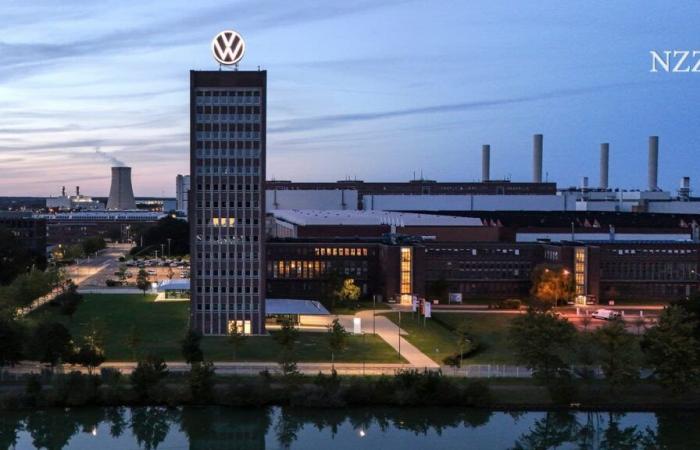The board of directors of the Volkswagen Group and the works councils of IG Metall have reached an agreement: layoffs for operational reasons are off the table, but the group wants to cut a good 35,000 jobs in a socially acceptable manner by 2030. Two plants could get new owners.
The company headquarters in Wolfsburg: On Friday, Volkswagen management and trade unionists reached an agreement after tough negotiations.
Jochen Eckel / Imago
The argument was too serious for an “O du merry one” to be uttered. But both sides at least managed to create more clarity for the around 120,000 VW brand employees in Germany before Christmas. Many employees will be angry and relieved at the same time, because compulsory layoffs are off the table despite over 35,000 job cuts by 2030.
NZZ.ch requires JavaScript for important functions. Your browser or ad blocker is currently preventing this.
Please adjust the settings.
This week alone it took a huge effort to reach an agreement between management and employee representatives, with around 70 hours of negotiations, sometimes deep into the night. The result is a classic compromise, in which the IG Metall trade unionists had to make extremely painful concessions.
Chronic poor productivity
The reduction of tens of thousands of jobs should occur over time in a socially acceptable manner, for example through severance pay programs and partial retirement. At the same time, the job guarantee for the remaining employees will come into force again and will be valid until the end of 2030. No more cars will be built in the Transparent Factory in Leipzig from 2026, but the factory will be put to another use, possibly outside of the group. The Osnabrück location, which is also smaller, will remain intact for the time being, but a sale is still under discussion.
The large plants in Emden and Zwickau will remain. The compromise is therefore within a framework that was outlined by the NZZ exactly a month ago.
The result is encouraging, as the VW brand has long been considered a restructuring case within the group. Productivity and margins are chronically weak. Generations of managers have already cut their teeth on sustainable renovation. The reason is the traditionally strong position of trade unionists in the company with the great influence of politics. The two representatives of the state of Lower Saxony, which has a blocking minority with 20 percent of the voting rights, have always held a protective hand over the employees.
This also applies to the currently incumbent Social Democratic Prime Minister Stephan Weil and his Green Minister of Education Julia Willie Hamburg, who both sit on the supervisory board and, together with the employee representatives, have a majority of votes. As a result, Volkswagen often resembles a state-owned company more than a private company. This has contributed to the employees enjoying excellent wages and some other unusual privileges compared to the industry. One consequence of this is low profitability.
The Volkswagen Group has been able to offset this in the past through profits in the lucrative Chinese market and from Audi and Porsche. But that is now over. In the Middle Kingdom, Volkswagen has lost touch with electric cars for the time being, Audi is also struggling with major problems, and even the traditionally most profitable brand, Porsche, is showing signs of weakness.
CEO Oliver Blume went “all in”
By demanding a tough and sustainable restructuring of the brand, CEO Oliver Blume took a risk. He brought into play the closure of up to three factories, tens of thousands of redundancies and a blanket wage cut of 10 percent for German VW employees. In the world of poker, given these goals, one would probably speak of “going all in.” He didn't get everything, but he can hardly have expected that.
With the measures, Blume and his team wanted to achieve a margin of 6.5 percent for the core VW brand. The most important thing in the negotiations was to achieve this target. This seems to be possible with the planned measures. Although profitability would still be significantly lower than that of its Czech sister brand Skoda, VW could probably finance the large investments in e-mobility and digitalization itself.
For Blume, the big risk was worth it, which is a sensation for the Wolfsburg structures with their dependencies and cliques. The state of Lower Saxony has also given its place for the drastic measures. This was probably a little easier because the affected factories are all in Saxony.
Market development plays an important role
Remarkable cuts are now on the agenda for Volkswagen by 2030. Whether these are ultimately sufficient to achieve the desired profitability depends on numerous factors. These include the attractiveness of upcoming models, market development in China, the success of new competitors and sales of electric cars, which VW has been focusing heavily on for a few years.
At best, the brand's margin can skyrocket to unimagined heights in a better environment; at worst, management will have to make adjustments in a few years. Then it says: “Every year again.”
You can contact Frankfurt business correspondent Michael Rasch on the platforms X, Follow Linkedin and Xing.






